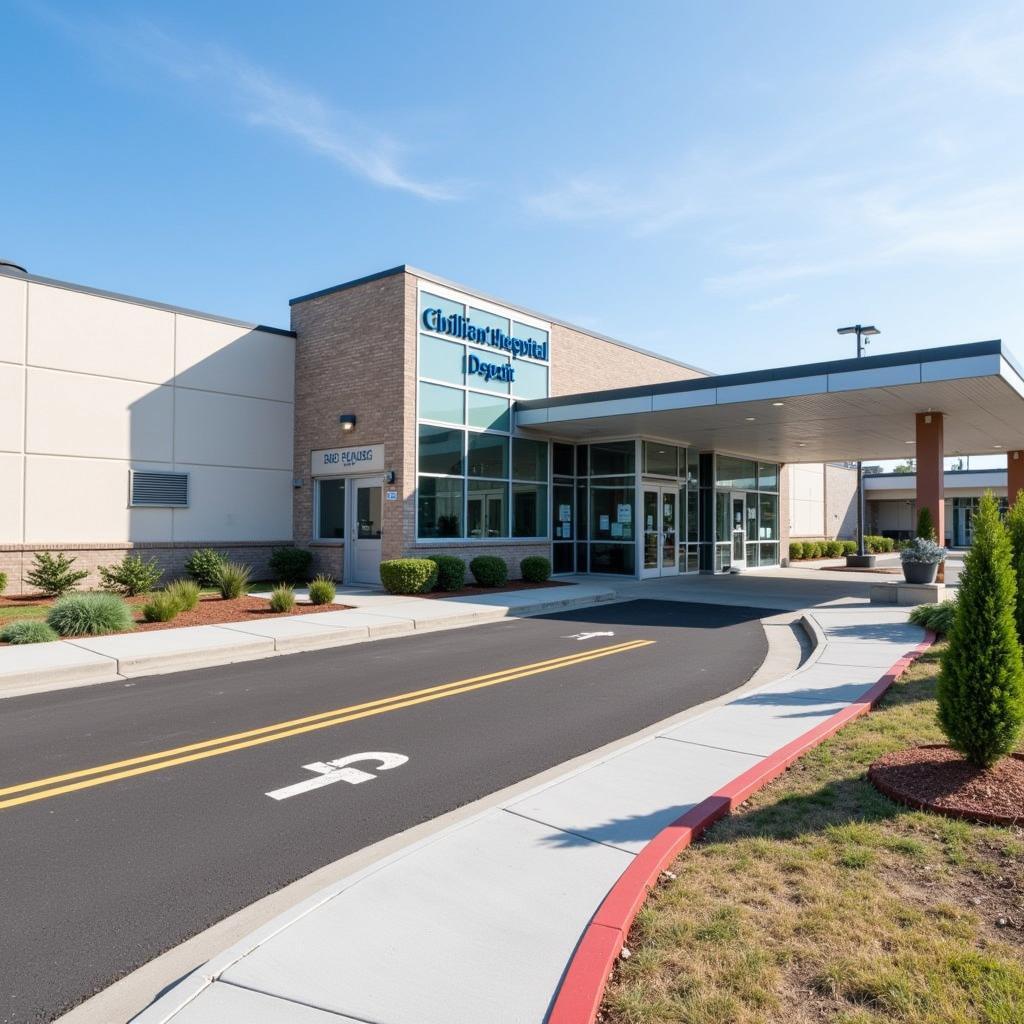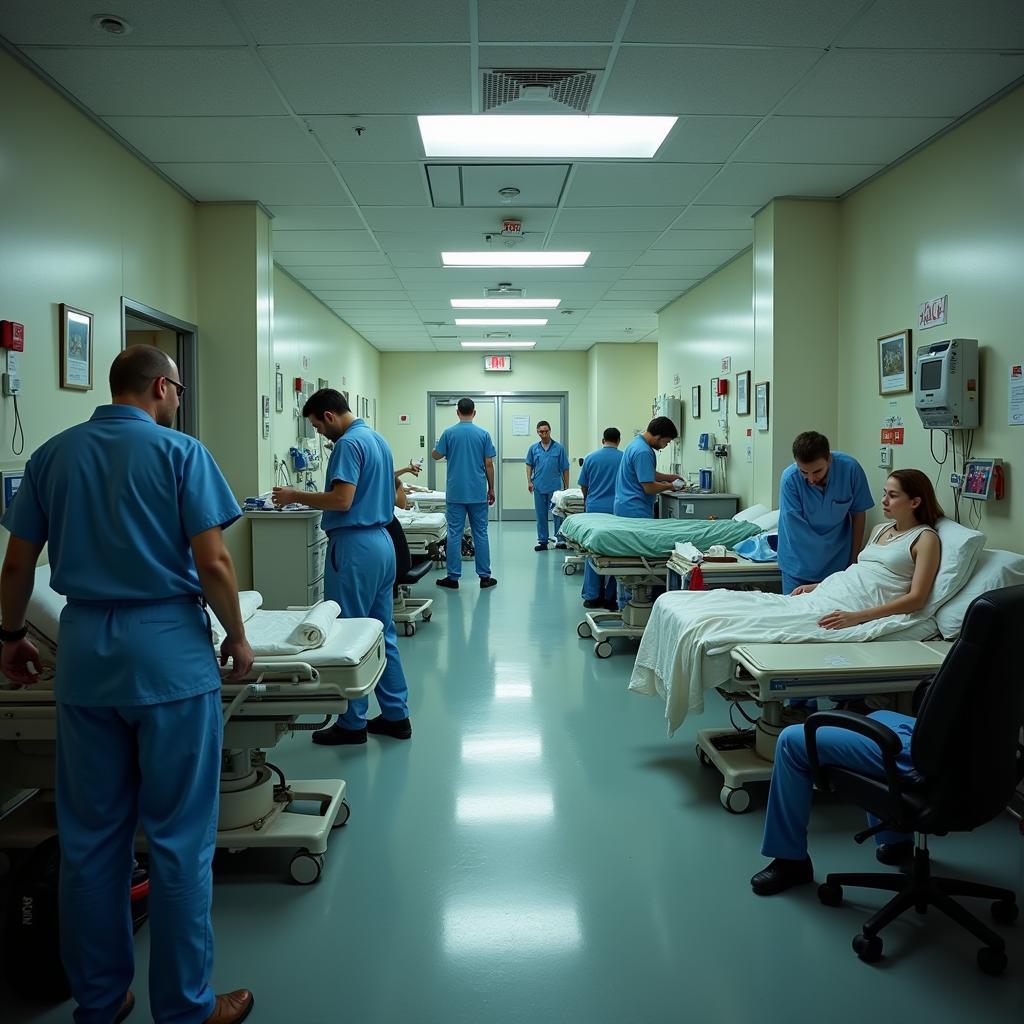Civilian Hospitals serve as cornerstones of healthcare, offering a wide range of medical services to the general public. Unlike military or specialized facilities, civilian hospitals cater to the diverse needs of communities, providing essential treatment, preventative care, and emergency services.
What Defines a Civilian Hospital?
 Modern Civilian Hospital Building
Modern Civilian Hospital Building
A civilian hospital is a healthcare institution open to all members of the public, regardless of their background, occupation, or insurance status. These hospitals prioritize serving the health needs of the community, offering a comprehensive range of medical specialties and treatments.
Key Characteristics of Civilian Hospitals:
- Accessibility: One of the defining features is their open-door policy. Unlike hospitals with specific admission criteria, civilian hospitals strive to provide medical care to anyone in need.
- Comprehensive Services: From routine checkups and complex surgeries to emergency care and rehabilitation, these hospitals house numerous departments and specialists to address various health concerns.
- Community Focus: Civilian hospitals are deeply integrated into the communities they serve. They often host health fairs, participate in outreach programs, and tailor their services to address prevalent health issues within the local population.
What to Expect at a Civilian Hospital
Navigating the world of healthcare can feel overwhelming. Here’s a glimpse into what you can expect when visiting a civilian hospital:
- Emergency Services: Civilian hospitals are equipped to handle medical emergencies 24/7. Emergency rooms (ERs) are staffed with trained professionals ready to provide immediate care for critical conditions.
- Inpatient and Outpatient Care: Depending on the nature of your medical needs, you might receive treatment as an inpatient (staying overnight at the hospital) or an outpatient (visiting for appointments and procedures without an overnight stay).
- Specialized Departments: Civilian hospitals feature a variety of departments dedicated to specific areas of medicine. These may include cardiology, oncology, pediatrics, orthopedics, and many more, ensuring comprehensive care for diverse medical needs.
- Diagnostic Services: To accurately diagnose and treat medical conditions, these hospitals offer a range of diagnostic services such as laboratory tests, X-rays, ultrasounds, CT scans, and MRI scans.
The Importance of Civilian Hospitals in Public Health
 Busy Civilian Hospital Emergency Room
Busy Civilian Hospital Emergency Room
Civilian hospitals play a critical role in upholding public health by:
- Disease Prevention: Many offer preventative screenings, vaccinations, and health education programs to promote community well-being and reduce the incidence of preventable diseases.
- Health Equity: By striving to provide care regardless of a patient’s ability to pay, civilian hospitals contribute to health equity, making healthcare accessible to vulnerable populations.
- Emergency Response: During public health crises, natural disasters, or other emergencies, these hospitals act as essential pillars of support, providing critical care and coordinating with other healthcare providers to manage the situation effectively.
Choosing the Right Civilian Hospital for You
While accessibility is a hallmark, selecting the right civilian hospital for your needs involves some consideration:
- Insurance Coverage: Verify which hospitals are in your insurance network to maximize coverage and minimize out-of-pocket expenses.
- Specialization: If you require treatment for a specific condition, research hospitals known for their expertise in that area.
- Location and Accessibility: Consider the hospital’s proximity to your home and the availability of transportation options.
- Patient Reviews: Online reviews from other patients can offer insights into a hospital’s overall quality of care, communication practices, and patient satisfaction.
 Skilled Surgical Team in a Civilian Hospital
Skilled Surgical Team in a Civilian Hospital
Seeking Medical Care: When to Visit a Civilian Hospital
Understanding when to seek care at a civilian hospital is crucial for your well-being:
- Emergencies: Conditions like chest pain, difficulty breathing, severe bleeding, or sudden loss of consciousness require immediate medical attention at the nearest emergency room.
- Urgent Care: For non-life-threatening but urgent situations like sprains, minor burns, or severe infections, you can visit an urgent care center affiliated with a civilian hospital.
- Routine Check-ups and Preventative Care: Schedule regular appointments with your primary care physician at a civilian hospital for routine health screenings, vaccinations, and management of chronic conditions.
Navigating Healthcare: You Don’t Have to Go It Alone
Civilian hospitals are more than just medical facilities; they are community pillars dedicated to providing comprehensive and accessible healthcare. By understanding the services, navigating the system, and prioritizing your health, you can confidently seek the care you deserve.
Need help finding the right resources? Our team is here to provide support and guidance.
Contact us:
Phone: 02437655121
Email: [email protected]
Address: Số 298 Đ. Cầu Diễn, Minh Khai, Bắc Từ Liêm, Hà Nội, Việt Nam
We offer 24/7 customer support to answer your questions and connect you with the information you need.